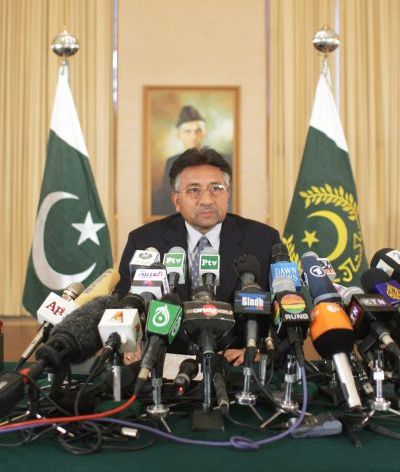|
|
| Help | |
| You are here: Rediff Home » India » News » First Look |
|
 Facing mounting international and domestic pressure, Pakistan President Pervez Musharraf [Images] on Sunday announced that elections to national and four provincial assemblies will be held by January nine but refused to fix a date for lifting emergency.
Facing mounting international and domestic pressure, Pakistan President Pervez Musharraf [Images] on Sunday announced that elections to national and four provincial assemblies will be held by January nine but refused to fix a date for lifting emergency.
A caretaker government will be in place by November 15 to oversee the poll process after the dissolution of the assemblies on that day, he said nine days after he imposed emergency.
Polls will be held simultaneously to the national and four provincial assemblies in the week preceding January nine and the exact date would be decided by the Election Commission, Musharraf said.
Blaming the sacked Supreme Court Chief Justice Iftikhar Mohammad Chaudhry and some other judges for paralysing the Pakistani administration and law enforcement agencies, he ruled out their re-instatement.
Without giving any time frame for lifting the emergency, the Pakistani leader said its imposition had reinforced the fight against terror in the North-West Frontier Province, including in Swat.
Musharraf also said he will take oath as a 'civilian President' when the Supreme Court allowed the Election Commission to formally notify the result of the October 6 presidential election.
"I hope that happens as soon as possible," he said.
The President said he was addressing the press conference to dismiss 'aspirations, rumours and speculation about his intentions.'
Giving details about the election process, Musharraf said the national assembly will be dissolved on November 15 when it completes its term while the provincial assemblies of Punjab, Sindh, NWFP and Balochistan, whose tenures will end on different dates in November and December, will be dissolved on November 20.
Caretaker governments will be formed in the three provinces of Sindh, Punjab and Balochistan by November 20. The North West Frontier Province already has a caretaker set-up as the provincial government resigned last month.
Musharraf defended his decision to impose emergency, insisting he had done nothing wrong and did not violate the Constitution.
"I did not violate the Constitution and the law of this land," he asserted.
Musharraf said he imposed emergency in national interests, calling it 'the most difficult decision' of his life.
Replying to questions on a timeframe for lifting the emergency, Musharraf said he could not give any date.
"The emergency has to be lifted but I cannot give a date. We are having a difficult situation, so I cannot give a date," he said.
The imposition of emergency had reinforced the fight against terror in the Northwest Frontier Province, he said.
He claimed the emergency was to ensure betterment of the prevailing conditions in Pakistan.
He said it was a question of either not acting to reinvigorate the paralysed law enforcement system, which had led to an economic downturn.
The Pakistani government had 'almost become non-functional' under the circumstances, he said.
Asked if he felt that the emergency rule could affect international aid from coming into Pakistan, Musharraf said all leaders who had spoken to him had stated that they understood the ground reality in the country.
He did not hope that there would be any disruption of international aid. Imposition of emergency, he said, had put the derailed part of democracy back on the rail.
Musharraf has come under fierce international pressure for imposing emergency rule, suspending Constitution, sacking the nation's chief justice and bringing in tight media curbs.
Photograph: John Moore/Getty Images | Reportage: PTI
Also Read:
Pakistan to lift emergency within a month
The case of Musharraf and the drunk uncle
More on the Pakistan Crisis
|
|
| © 2007 Rediff.com India Limited. All Rights Reserved. Disclaimer | Feedback |